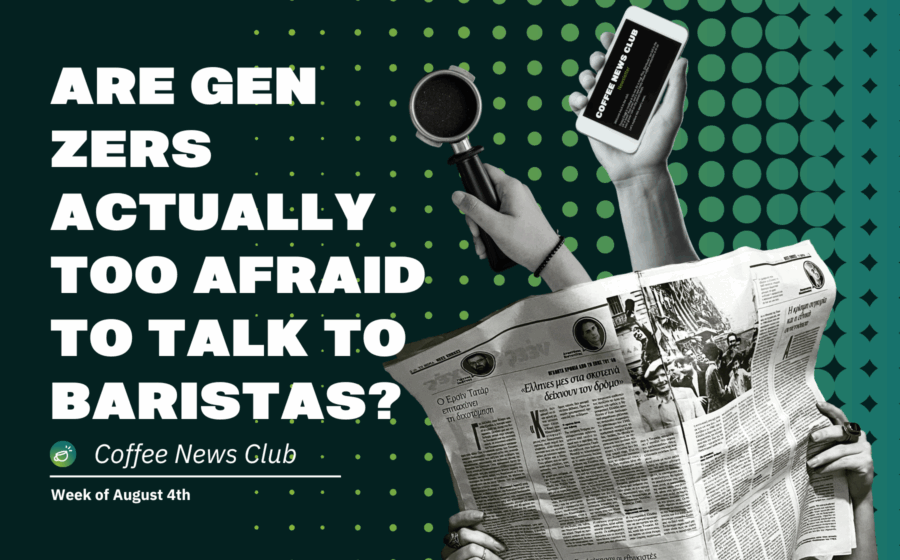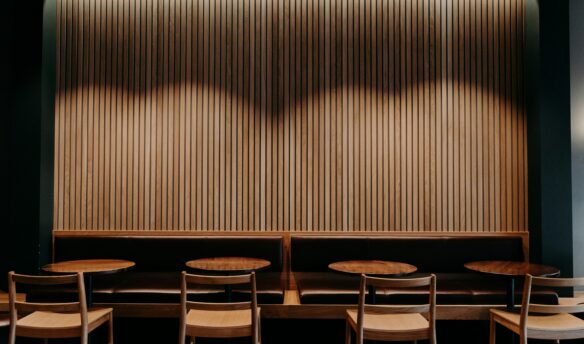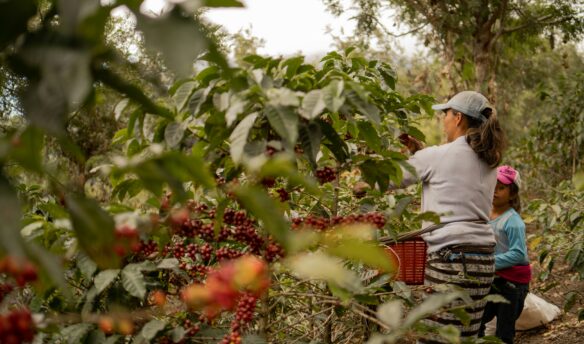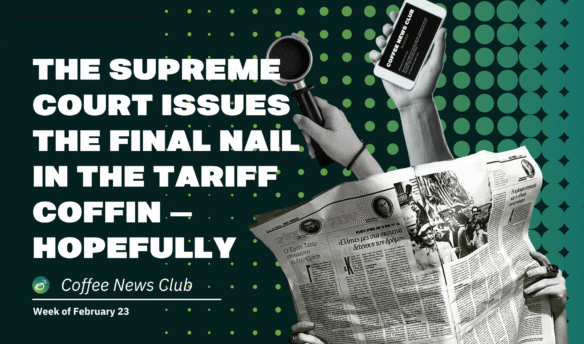Does ordering coffee from a barista scare you? You might not be alone. Plus: it’s possible coffee may be exempt from impending tariffs, and how a Philz Coffee buyout is leaving workers who invested in the company empty-handed.
👋 Get the Coffee News Club newsletter in your inbox weekly—sign up.
‘Coffee and Cocoa Could Be Exempt From Tariffs in Trade Deals, Commerce Secretary Says’ – via Reuters
With a 50% tariff on Brazilian imports set to take effect August 1, many in the coffee industry are scrambling to find ways to keep sourcing from the world’s largest coffee producer. However, the industry received good news on July 29 when U.S. Commerce Secretary Howard Lutnick hinted at the possibility that coffee may be exempt from tariffs.
As Marcelo Teixeira reports, Lutnick told CNBC that President Trump “has agreed to set zero tariffs for those natural resources that are not grown in the U.S. in the trade deals he has closed.”
Lawmakers and the National Coffee Association have been lobbying for coffee to be exempt from tariffs, arguing that the U.S. coffee industry is 99% dependent on imports. Last week, members of the newly-formed Congressional Coffee Caucus wrote to the head of the U.S. trade agency, noting that “because there is no viable domestic substitute, tariffs on imported coffee create challenges for the industry.”
Lutnick acknowledged this in his interview with CNBC. “If you grow something and we don’t grow it, that can come in for zero,” he said. “So if we do a deal with a country that grows mangos, pineapple, then they can come in without a tariff, because coffee and cocoa will be other examples of natural resources.”
However, the agreement would apply only to countries with newly negotiated trade deals with the U.S. That would include Indonesia, the world’s fourth-largest coffee producer—but not Brazil. Still, it is the first suggestion that coffee could receive a broader tariff exemption, though that won’t help importers and roasters with Brazilian shipments arriving before the details are resolved.
Read all about the possible tariff exemptions here.
‘Philz Coffee Close to Closing Deal To Sell to Private Equity Firm for $145 Million’ – via Mission Local
Private equity firm Freeman Spogli & Co. is close to finalizing a $145 million deal to acquire San Francisco-based specialty coffee chain Philz Coffee. As part of the agreement, the company’s common stock—owned by some current and former employees—would be canceled, leaving those investments “effectively worthless.”
Philz was founded in 2003 by father-and-son team Phil and Jacob Jaber—the shop had no espresso machine and only served pour-over style coffee brewed by the cup. Over the last decade, the brand grew rapidly using venture capital investment and became “Silicon Valley’s cup of choice,” according to Forbes.
Philz has received multiple rounds of funding: in 2013, they received an “eight figure” investment from Summit Partners; in 2015, they received $15 million in Series B funding; and in 2016, they received $45 million. These investments, totaling $75 million, helped Philz expand to over 70 locations around the country (primarily in the Bay Area but with a handful of locations in Chicago).
As Jessica Blough reports for Mission Local, those set to “receive payouts or bonuses from the deal” include Philz board members (including the Jabers), the company’s CEO, and representatives from firms that previously invested in the brand. However, those holding common stock, which includes current and former employees, will have their stock canceled.
“All Common Stock will be canceled for no consideration and all Options will be canceled and extinguished for no consideration,” documents obtained by Mission Local read.
Common stock is “a form of ownership in a corporation, representing a claim on part of the company’s assets and earnings,” according to Investopedia. However, common stock is of lower priority and has fewer protections compared to preferred stock. Blough explains that common stock dissolution is rare unless a company is facing liquidation or bankruptcy.
One former employee paid $40,000 to purchase common stock. “Philz ran out of money. That’s really what it is,” the employee said. “When I saw the price, I thought, well, I hope I can get some of my money back.”
Read the full story on the sale here.
‘Increasing Number of Gen Zers Are Suffering From ‘Baristaphobia’ and Too Afraid To Talk to Humans in Coffee Shops’ – via The Independent
Young people find baristas intimidating. That’s what a survey from the home appliances maker Philips found, which polled Gen Z on their cafe-visiting activities. (For what it’s worth, the writer of this newsletter is 38 years old, a former barista, and also finds baristas intimidating.)
Forty-seven percent of Gen Z survey respondents won’t even enter a coffee shop, reports Isabel Keane for The Independent, citing anxiety over having an awkward encounter with a barista or picking up the wrong order. Most preferred to order through their phone for drive-thru collection or delivery.
The story doesn’t detail the number of people surveyed or the ages of respondents. The story also doesn’t link to the survey itself (we searched for the original study and found nothing).
According to The Independent, 7% of those surveyed “admitted to suffering from ‘Baristaphobia,’ or being too scared to even approach a barista.” Two out of five said that making coffee for someone else also scares them, “and that they fear the social consequences of making a potentially bad cup,” Keane wrote.
Philips is a multinational corporation that sells everything from electronic appliances to ultrasound scanners. They also happen to sell home espresso machines, an angle to consider when taking in these findings. Keane chatted with Lizzie Lee from Philips, who thinks young people should channel that nervous energy into home equipment.
“Gen Z wants great coffee without the pressure,” Lee said. “Whether it’s avoiding awkward cafe encounters or sticking to a tighter budget, brewing at home gives them full control – taste, cost and convenience.”
Read more on the (potentially manufactured for marketing) awkwardness of youth here.
More News
‘SCA Announces World Coffee Championships in Brussels and Bangkok’ – via Daily Coffee News
‘Kenya to Map Coffee Farms as Part of EU Regulations’ – via Global Coffee Report
‘Coca-Cola’s Failed Coffee Investment Faces Uncertain Future’ – via Yahoo! Finance
‘Oakland Palestinian Cafe Responds to Antisemitism Lawsuit From Trump Administration’ – via San Francisco Chronicle
‘Starbucks Ditching Mobile-Order Stores Which Lack ’Warmth’ as Sales Fall’ – via The Independent
‘A Scientific Breakthrough in Arabica Roasting’ – via Global Coffee Report
The Week in Coffee Unionizing
- Workers at four Blue Bottle Coffee locations in the Bay Area won their union election. Staff at stores in Berkeley and Oakland filed to join the Blue Bottle Independent Union in June, following the success of an organizing campaign by Blue Bottle workers in Boston a year earlier. “We have growing ranks of baristas realizing they deserve better,” said BBIU president Alex Pyne.
- In Cleveland, workers at Rising Star Coffee are seeking to unionize in response to an assistant manager who raised work safety concerns and was fired. Workers told Mark Oprea of Cleveland Scene that a faulty carbon monoxide alarm at one of Rising Star Coffee’s locations led to multiple workers becoming sick. The assistant manager, named Allie Jeswald, first noticed the carbon monoxide alarm and then started a public awareness campaign to raise concerns, including writing a letter to demand better safety protocols. Jeswald was then fired. “I really liked my job,” Jeswald said. “I just want to feel safe and not, like, afraid for my life.”
- Birdcage Comics Cafe in San Bernardino, California, announced abruptly that it’d be shutting down, shortly after staff unionized. Just a week after the company’s owner formally recognized the Birdcage Workers Union, the company issued a statement on Instagram saying, “We are not in a financial position to keep the doors open at this time.” Workers had been on strike over what they described as unsafe working conditions and discrimination, but agreed to return after winning union recognition and a commitment to negotiate a contract.
Beyond the Headlines
‘Forget Starbucks—Yemeni Coffeehouses Are the Real Third Places’ by Fionn Pooler






